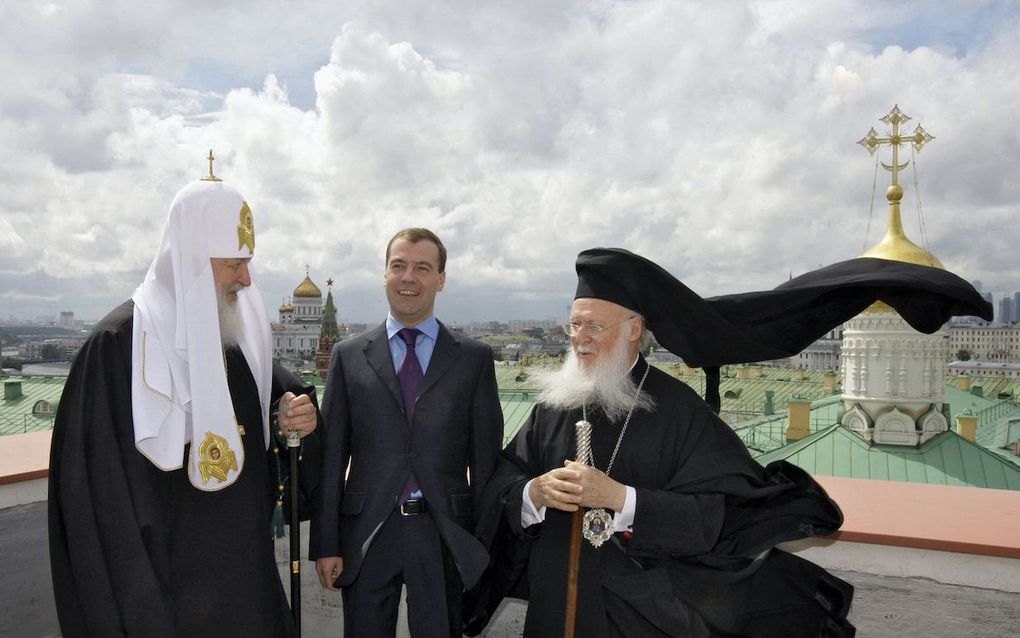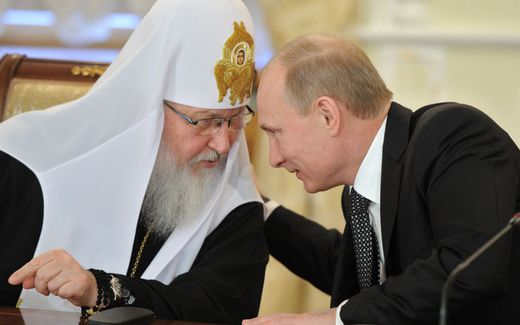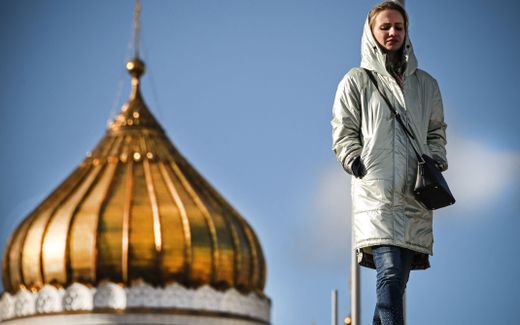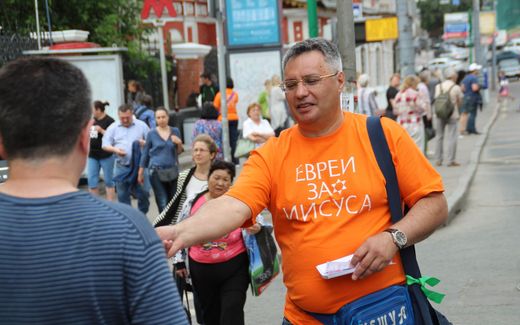Why is Russia so ungrateful, asks leader of Orthodox mother church

In better times. The Russian patriarch Kirill (left) and the Ecumenical patriarch Bartholomew (right) together with the Russian president Dmitry Medvedev on top of the Kremlin in Moscow in 2010. Today, the relation between the two patriarchs is full of conflict about Ukraine. Photo AFP, Dmitry Astakhov
Eastern Europe
Tensions between the Russian Orthodox Church and the Orthodox Church of Ukraine have risen again in the past few weeks. The Russian church does not recognise the equal position of its Ukrainian counterpart. But the primary bishop of the Orthodox Churches, Patriarch Bartholomew, said last week that he "does not care" about the "ignorant behaviour" from the Russian part of the church.
Bartholomew was in the United States the past weeks, mainly to meet the Greek Orthodox Churches in America. He also met with US president Joe Biden, Secretary of State Anthony Blinken and House Speaker Nancy Pelosi. And in-between, he was in hospital for a few days.
During his 12-day trip to the US, he spoke a lot with others and the media about the enduring problem within the Orthodox church family. Since the Ukrainian independence in 1991, the question burns whether the church should be independent as well.
The Ukrainian Orthodox Church answered this question with yes in 1992. And appointed their own patriarch, Filaret, in 1993. But ecclesiastical independence (named autocephaly; self-headed) was not officially granted by the ecumenical patriarch, bishop Bartholomew of Constantinople, the hierarchical head of the church, until early 2019.
Connected with politics
The history of autocephaly has always been connected with political aspects. The issue of autocephaly is usually closely linked to the issue of self-determination and political independence of a nation; self-proclamation of autocephaly was usually followed by a long period of schism with the mother church.
The Patriarch of Constantinople (also called the Ecumenical Patriarchate) grants the self-headedness for a church province. For the last thirty years, it was archbishop Bartholomew who took this office. "It's the exclusive right of the Ecumenical Patriarch to give autocephaly", Bartholomew says. But the Russian Patriarchate states that it cannot be the personal responsibility of one archbishop only to take such an important decision.
Real church or not?
Soon, it was no surprise that there were two Orthodox Churches in Ukraine: one under the patriarchy of Kiev (KP) and one that remained under the patriarchy of Moscow (MP).
The situation in Ukraine raised doubt about whether this church was really a church in the spiritual sense. The priests of the "schismatic" church, as the Russians say, did not stand in the line of the apostolic succession and could therefore not administer the sacraments validly and announce the forgiveness of sins in the confession box.

After 1991, there has been a long and intense debate within the Eastern Orthodox Church about recognising the Ukrainian Orthodox Church (UOC) as part of the family. It was mainly the Russian Orthodox Church that was against this. For the simple reason that both the Russian state and the church do not recognise Ukraine as independent. It is known that President Putin has said to foreign leaders that "the Ukraine" is a region of Russia, as "the Harz" is a region in Germany. And if Ukraine is no independent country, the church cannot have the "autocephaly" that makes it independent.
Russia reacted "angrily"
Late 2018 a decision was made. Patriarch Bartholomew granted the Kiev Patriarchate independence. After creating the UOC, it received a "Tomos of autocephaly" (a letter of independence) from Patriarch Bartholomew of Constantinople.
But Russia reacted "angrily", according to Patriarch Bartholomew. The Russians say that the Ukrainian government initiated persecution against the "canonical" Ukrainian Orthodox Church (meaning the MP part: Moscow Patriarchate). The Ukrainians say this is a lie. The Russian church, however, halted official contact with the Patriarchate of Constantinople.
The church leader could not understand the Russian position. "We gave them the light. We gave them the Cyrillic alphabet, through which we wanted to help them cultivate their civilisation. And they, as we say in church language, began to "kick" against their benefactor", he said, according to the European Times.
Bartholomew does "not care" about all the criticism from the Russians, he said last week. "I have the first throne in Orthodoxy. In recent years that has been tested by the ignorant behaviour of the Russian Church concerning its mother church. We are the mother church because we gave them Christianity", Bartholomew said in New York according to the Russian news portal Ria Novosti. According to the Greek newspaper Kathimerini he added that the Russian church is "ungrateful" to the mother church.
The Orthodox 'pope' finds the Russians not very consequential in their criticism. He does not see a difference between the case of Ukraine on the one hand and Russia, Bulgaria, Greece, Albania, Poland, Romania on the other hand. Earlier, he suggested that "the geopolitical goals of Moscow" interfered with the issue, according to Ria Novosti.
"Lost consciousness"
According to Moscow, Bartholomew has gone much too far in visiting Kiev for the 30-year's independence jubilee of Ukraine in late August this year, says Metropolitan Hilarion, the 'minister of foreign affairs of the Moscow Patriarchate. According to Ria Novosti, Hilarion said on the Russian television that Bartholomew "lost his canonical consciousness". The man speaks for his own church only, but is no longer "the spiritual leader of the 300 million Orthodox population of the planet. He no longer represents world Orthodoxy", according to Hilarion.
Earlier, Mr Hilarion said that Bartholomew fulfilled "a US order" to divide Ukraine, according to Ria Novosti.

According to Bartholomew, 40 or 50 million inhabitants of Ukraine wanted to have their local, "or –if you want– a national church, so as not to depend on Moscow." This was the only way to restore official communication with the Ecumenical Patriarchate and the rest of the church family. Bartholomew claims that he took the decision "only and exclusively in the spiritual interests of the people of God", he said in late October in a lengthy interview to the Cypriot newspaper Politis.
He had asked the new Patriarch of Kiev, Epiphanius, to honour his Russian counterpart, Patriarch Kirill of Moscow.
Libellous campaign from Moscow
The autocephaly of the Ukrainian church is nothing more than "restoring justice in Kiev", he says. In the 20th century, the mother church in Constantinople had to accept that the rights were taken away from Kiev to Moscow under pressure of the Soviet Union. But that is all history, he says. He does not want to "obey secular demands" which are "contrary to our canonical and historical arguments" from them who "use their economic and secular power and authority against the churches". From Russia, there had been a "libellous campaign" against him, he told the Cypriot newspaper Politis.
The Russian church has cut off contact with Constantinople in 2019. However, Bartholomew says the connection is still intact.
It won't be solved soon
Religious expert Roman Lunkin told Russian media that this conflict between Moscow and the mother church would not be reconciled soon. "It won't be resolved within the lifetime of Patriarch Bartholomew", he said to the online platform Ridus. In that case, it won't be a conflict that will be solved soon.
Related Articles






